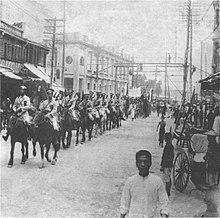The Northeastern Army (simplified Chinese: 东北军; traditional Chinese: 東北軍; pinyin: Dōngběi Jūn), was the Chinese army of the Fengtien clique until the unification of China in 1928. From 1931 to 1933 it faced the Japanese forces in northeast China, Jehol and Hebei, in the early years of the Second Sino-Japanese War.

Zhang Xueliang commanded this army after the assassination of his father. Prior to the Mukden Incident it possessed 12 infantry brigades and 3 cavalry brigades (estimated at 179,505 troops) in northeast China, in addition to 12 infantry brigades, 2 cavalry brigades and 3 artillery brigades stationed in northern China.[1] This Chinese army was badly underarmed after the retreat from the northeast, following the Mukden Incident when most of the arsenals and their arms were seized by Japan. Many units were only equipped with handguns, grenades, and traditional Chinese swords. It defended Chinchow against the Japanese in 1931, and Jehol and Hebei against the Japanese Operation Nekka in 1933. Zhang Xueliang was relieved of command after the fall of Jehol, being replaced by General He Yingqin.
See also
Sources
- [1] Mukden Incident - 9/18/1931, http://www.republicanchina.org/war.html#Mukden_Incident
- [2] Battles of the Great Wall - 3/1933, http://www.republicanchina.org/war.html#Chang-Cheng-Zhi-Zhan